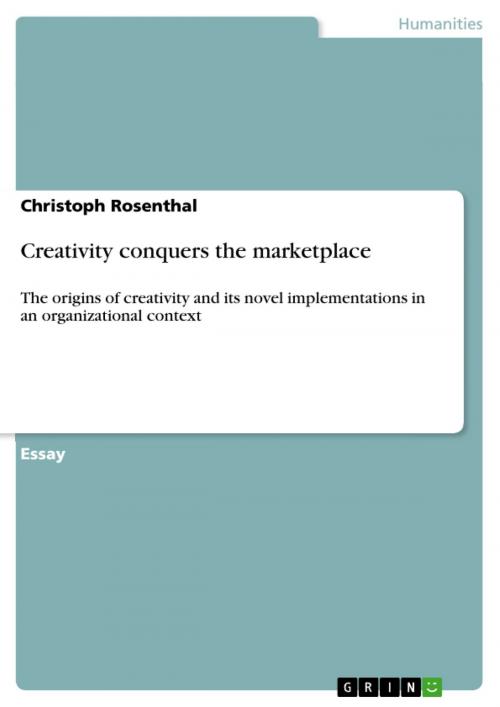Creativity conquers the marketplace
The origins of creativity and its novel implementations in an organizational context
Nonfiction, Social & Cultural Studies, Social Science, Sociology| Author: | Christoph Rosenthal | ISBN: | 9783656611417 |
| Publisher: | GRIN Verlag | Publication: | March 7, 2014 |
| Imprint: | GRIN Verlag | Language: | English |
| Author: | Christoph Rosenthal |
| ISBN: | 9783656611417 |
| Publisher: | GRIN Verlag |
| Publication: | March 7, 2014 |
| Imprint: | GRIN Verlag |
| Language: | English |
Essay from the year 2011 in the subject Sociology - Work, Profession, Education, Organisation, grade: 9.0/10, Erasmus University Rotterdam, language: English, abstract: Leadbeater's (2000) metaphor of 'a new economy living on thin air' gives a good idea of how to conceive of the knowledge economy. Creativity is an essential feature of the knowledge economy and has transferred from being characteristic for particular niche industries to an overarching, critical, and peculiar feature of various sectors (Pratt & Jeffcutt, 2009). Organizations have been trying to find management solutions and entrepreneurial approaches to fruitfully implement creativity and balance the innate tensions between creativity, control, and organizational structure. The essay at hand provides solutions to this dilemma and identifies starting points for implementing key characteristics and management strategies of creative organizations into creatively managing non-creative organizations. The subject matter will be discussed along the lines of the following set of interrelated questions. •What exactly is creativity, where does it come from and what is its significance in an organizational management context? •What constitutes creative organizations and where does innovation fit in? •To what extend has creativity forged new forms of organizations or has been beneficially implemented by technically non-creative organizations? •What are some innovative and collaborative approaches by organizations to take advantage of the collective nature of the knowledge economy?
Essay from the year 2011 in the subject Sociology - Work, Profession, Education, Organisation, grade: 9.0/10, Erasmus University Rotterdam, language: English, abstract: Leadbeater's (2000) metaphor of 'a new economy living on thin air' gives a good idea of how to conceive of the knowledge economy. Creativity is an essential feature of the knowledge economy and has transferred from being characteristic for particular niche industries to an overarching, critical, and peculiar feature of various sectors (Pratt & Jeffcutt, 2009). Organizations have been trying to find management solutions and entrepreneurial approaches to fruitfully implement creativity and balance the innate tensions between creativity, control, and organizational structure. The essay at hand provides solutions to this dilemma and identifies starting points for implementing key characteristics and management strategies of creative organizations into creatively managing non-creative organizations. The subject matter will be discussed along the lines of the following set of interrelated questions. •What exactly is creativity, where does it come from and what is its significance in an organizational management context? •What constitutes creative organizations and where does innovation fit in? •To what extend has creativity forged new forms of organizations or has been beneficially implemented by technically non-creative organizations? •What are some innovative and collaborative approaches by organizations to take advantage of the collective nature of the knowledge economy?















